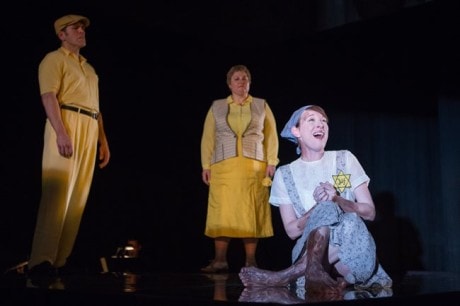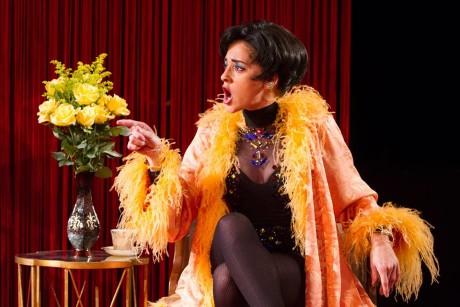Say “operatic double bill” and two duos spring to mind, for aficionados and amateurs alike. From the mid-20th century, Gian Carlo Menotti’s The Medium and The Telephone; from the late-19th century, the sure-fire pairing of “Cav and Pag,” verismo works by Pietro Mascagni (Cavalleria Rusticana) and Ruggero Leoncavallo (Pagliacci). The 21st century, young as it is, may already have a new one to offer, one that follows in their footsteps while advancing, in 21st-century musical language, their aesthetic legacy. And there’s just one more weekend to hear it, at the Atlas Performing Arts Center in Northeast Washington, DC.

After Life, presented by UrbanArias thru Sunday, April 9th, envisions an other-worldly, score-settling encounter between two of the 20th century’s most controversial creative artists. From verbally combative and scathingly accusatory to contemplative and reflective, with music that soars and roars, sears and weeps—the music is by Tom Cipullo, the libretto by David Mason—this imaginatively conceived hypothetical meeting is operatic in both the most elevated, and most elemental sense of the word.
We enter to the sounds of what sounds like players warming up. As our eyes grow accustomed to the darkness, we dimly perceive in the shadows, illuminated at appropriate points by small bright lights, a five-piece instrumental ensemble. So the “players” part is true. The “warming up”? Not so much: The pianist, who is visible to those of us seated in the vicinity of stage right, is following a score. As our night vision kicks in further, we see that behind the towering black platform on which the action will take place, the other members of the Inscape Chamber Orchestra (Anne Donaldson, violin; Natalie Spehar, cello; Susanna Loewy, flute; Evan Solomon, clarinet; R. Timothy McReynolds, piano) are doing so as well. Small in size, under the able direction of Robert Wood, their command of music which is only minimally derivative and greatly intuitive, and their responsiveness to the singers, would be a notable contribution to the performance’s success.
David L. Arsenault’s set is simple, functional, and evocative. While the singers are elevated to, figuratively speaking, a heavenly height (eight feet, perhaps?) a mirrored ceiling directly above the platform allows us to see them in reverse angle, offering the audience a different, off-kilter perspective, illustrating Director Alan Paul’s contention that “Hell is looking at yourself for eternity.”
As Gertrude Stein, mezzo-soprano Catherine Cook, dressed in springtime shades of lime green, yellow, and light blue (by Costume Designer Hunter Kaczorowski) and entering with a Brünnhilde-like “Hey. He. Ah. Oh. Who?” is commanding, her voice powerful and richly resonant, negotiating the octave-plus leaps and unconventional intervals with effortless élan. The atonality, which in other works can be off-putting for listeners more comfortable with chromatic composition, in Cipullo’s work feels so emotionally authentic, so true and real, that when the music resolves at last into a familiar chord, the sensation is one of coming home after a long journey; the intensity, almost palpable.
As Pablo Picasso, baritone Michael Mayes, clad in lemon and pale yellow, a gold cap sitting rakishly atop his head, is jaunty and irreverent—till he spots Stein. “I grew to hate you. Didn’t you know?” he asks her, adding: “You wanted to own me.” His voice strong and bright, Mayes is equally at ease with navigating the daunting vocal and tonal terrain.
The human territory is conspicuously more difficult for the characters they play. Stein asks Picasso to stay with her, and recalls a friend who killed himself. “Art is for life!” proclaims the painter is a clarion call, the top notes ringing and crystal-shattering. She chides him for his wealth; he responds that he was free. “No one was free in the war,” she responds quietly, her eyes hauntingly pained. “What did we leave for the living?” Reminding her that she lived in a country house, translating the speeches of Marshal Philippe Pétain, who headed the Nazi-supported French government at Vichy, Picasso accuses her of doing “nothing”; Stein sees no reason to apologize or atone: “One might as well be happy. / One cannot stop a war / so why stop being happy?”
As if in response, a simply dressed young woman enters, holding a yellow rose. “Why do I remember that? / A rose is a rose, I remember,” Stein muses. In what will be one of the opera’s defining moments, the girl (Ava Pines), her face shining with angelic sweetness, sings, in a kind of quiet ecstasy, the word “rose” in what may be the softest, stratospherically highest, most skillfully supported and exquisitely sustained, breathtaking, spine-tingling pianissimo this writer has ever heard. Opera buffs may later find their thoughts drifting back to another doomed and gentle “flower girl”: Mimì, in Puccini’s La bohème, who rejoices in the sweet fragrance of springtime, but whose artificial flowers, which she crafts to earn pennies, have none.
Virtually oblivious to the moral play being enacted before them, Picasso and Stein compete at self-promotion, each touting their public, artistic and moral bona fides, challenging and questioning the reasons for the other’s survival and vociferously protesting that they were “for life” but “died,” with Picasso, in noble artist mode, assuring us that “Art makes life out of death” and Stein asserting that “Imagination is resistance.” At one point, she spins around and we see above her breast a yellow star, the word “JUIF” (French for “Jew”) scrawled across it. Picasso quickly reminds her how protected she was. “What we wanted was more life,” she observes, replying but not responding, perhaps a nod by the librettist (one of many) to modernist mode. “I wish I could remember more. / What do the living think of us / as war begets another war?”
The question is left for us. As Stein remarks early on, “A question conjured us. / A question hangs in the dark.” And now—in an instant, we are plunged into darkness.
In a matter of minutes, there will be other questions, to which there also are no easy answers; even less so, satisfying ones.

For Josephine, a world premiere, the neck-stretching set has been replaced by an eclectically furnished, floor-level backstage dressing room, its wall-to-wall, cardinal-red carpet matched by a swaying red curtain comprising hundreds of floor-to-ceiling strands. Josephine Baker (soprano Melissa Wimbish) is saucily attired in a sleek black leotard accented with a sparkling, waist-embracing, rhinestone-encrusted medallion. A coral, floor-length, feather-trimmed cape billows around her; the outfit is completed with silky black tights ending in silvery high heels. Having introduced herself by virtue of her electric presence, Baker begins her calculated assault on the audience, her charm irresistible to the elderly gentleman in the front row, whom she flirtatiously coos at and, like a wily tigress, sultrily caresses.
But be not deceived: Josephine is not all flash and flare—she’s a high-octane gal. As is Wimbish, whose voice is as strong, sure and flexible as her limbs are at once balletically graceful and athletically lithe. For Josephine Baker, who took Paris by storm some 15 years in advance of the Nazi storm troopers scorned but feared by Picasso and Stein, assurance and nonchalance were as much learned as inborn. They were as necessary to her survival as they were part of the act that gained her fame in that legendary city of lovers, a continent away from a loveless, impoverished childhood—unscarred, as it had been, by the living legacy of slavery and discrimination.
Recalling when, as a light-skinned, “high yellow” black, she was rejected by black societies as cruelly as she was by white, Wimbish’s Baker is angry and resentful, the pain—fame notwithstanding—still inflamed, the wounds still raw. “Why didn’t you make us all the same color?” she rages at an unresponsive God. “It would have been so much easier.”
Wimbish, Director Alan Paul, Director of Production Courtney Kalbacker, and Stage Manager Diane Schramke, together with Composer/Librettist Tom Cipullo and all those acknowledged and praised for their work in After Life, help us to see Baker not just as an exotic, biracial, bilingual, binational American-born singing sensation whose nude dancing and wild-animal menagerie made her, as Wikipedia tells us, “a muse for contemporary authors, painters, designers and sculptors,” but as a woman who took pride in her 13 adopted children of all races and nationalities: “A rainbow,” she announces, Wimbush’s burnished tones thrillingly clear, and pingingly pitch-perfect, “for the world.”
As the program tells us, there was, alas, no pot of gold, for Baker or her “Baker’s dozen” children—there were 13 in all, if you include Jean-Claude, who was a teenager when they met, and who died of an apparent suicide last year—at the end of that rainbow. “Josephine was like the sun,” he wrote. “We need the sun for the flowers to grow . . . but if you come too close, you can get burned, you can die. Everyone who came too close to Josephine got burned.”
What is the responsibility of the artist—to his art, to his loved ones, to his country, to himself? Does that obligation change, depending on circumstance? To what degree can we, should we, do we “own” the decisions that we make because of them, in light of them—or in spite of them? Each of the characters in these two remarkable operas answers those questions in his own way: sometimes by default; sometimes by intent; sometimes by pretending they were never even asked. See these operas! And listen for the answers that respond to you.
Running Time: One hour and 40 minutes, with one intermission.
After Life | Josephine, presented by UrbanArias, plays through Sunday, April 9, 2016, at Atlas Performing Arts Center, in The Paul Sprenger Theater – 1333 H Street, NE, in Washington, DC. For tickets, call the box office at (202) 399-7993, or purchase them online.
RATING:




